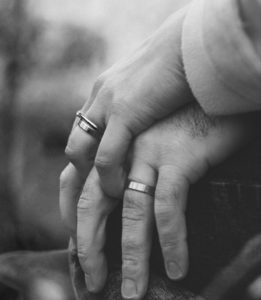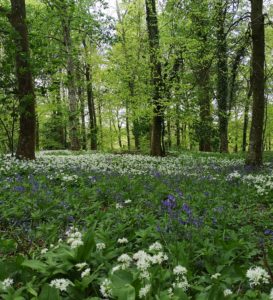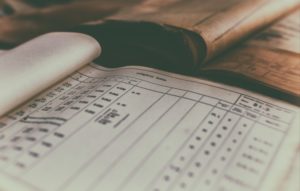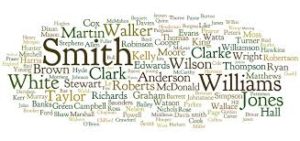Why is it women take their husband’s name after marriage?
What’s in a name?
I’ve seen many articles about the origins of a name but I want to explore the ‘tradition’ of women taking their husband’s surname after marriage.
With changing times, has it lost its favour? Is it still as important and is it acceptable for a man to take his wife’s name instead?
For me, it’s been a topic of much debate with my own not-husband on many occasions. He is a very traditional man, proud of his male lineage and believes strongly in passing down his family name.
Unfortunately, I too am proud of my surname and hate the idea of losing it! Luckily we aren’t planning to get hitched so it’s not an issue (and the name of this blog is safe), but that doesn’t stop us discussing it hypothetically now does it?
But why the dilemma?
My surname is unique! I am the only person with MY name and I love that!
My surname is in fact double-barrelled (no, I’m not posh) I just have two names as one. They’re both unusual so there are no other families with that combination. Only my brother and mother share it with me.
My parent’s decision to hyphenate my surname was due to their own situation; not through inherited wealth or nobility, as once would have been the case.
My parents were unmarried and chose to give their children both surnames, rather than choose between one or the other. It wasn’t until my parents married (due to Dad’s terminal illness) in November 2018, that my mum joined my younger brother and I, in sharing our surname. My mum too lost her father at a young age, so retaining his name was important to her also.

My older brother however, has only our Mum’s surname, as he’s the last male carrying that name down the line. If he’s does not have children (presumably passing down the name) then that name ends with him. Even more reason for me to keep mine, right?!
“Four Names?!”
Triple and quadruple barrelled surnames are pretty rare but they do exist. Ex-army officer and now Dorset MP, Richard Drax is actually the holder of four surnames. His full name is Richard Grosvenor Plunkett-Ernle-Erle-Drax. You can see why he drops the other three for official business!
His name developed over the years, right back as far as the 1500’s, passed down through the inheritance of the Charborough Estate in Dorset, South West England.

In fact ‘Drax’, the name the MP now uses, did not come into play until the 1700’s, when a man named Thomas Shatterden took his wife’s name (yes, this isn’t something new!) after she became heiress of Charborough House.
In those days, men would see no problem in taking the name of his wife, as social class out-ranked gender. And in fact entire families would adopt the name of the estate they were marrying into, to improve status.
So why is it seen as a negative thing in our modern world if a man takes his wife’s name? Men who do so are sometimes perceived as ‘passive’ or ‘more feminine‘. It is estimated that only around 3% of men are taking their wife’s name after marriage. Perhaps some don’t know it’s even an option?!
On a side note, I’ve visited the Charborough Estate – Highwood Gardens, on a charity open day for SSAFA, if you get the chance, go have a peak, especially when the bluebells are out! The photo for The Not Wife Life was taken there. It’s a beautiful sight!
But what are the options for a new name?
So back to names and this brings me to the situation where a person with a double barreled surname, meets someone who already has two names (or four!). What happens then? As we’ve discussed, having multiple barreled names is an option but doesn’t that just complicate life?
Or what about people like myself who were given a hyphenated surname at birth, rather than choosing to use one after marriage?
Deed Poll suggests there’s no limit on how many names a person can have, however; most official documents such as your passport or driving licence only allow up to 30 characters. Now mine is already 24 characters including the hyphen, so if I were to add my not-husband’s surname too, I’d be using 32! Nightmare! (Besides, it’d sound crap anyway, sorry darling!)
It would simply become an official nod to my husband and not used day to day, so what would be the purpose?
Some countries recognise common-law ‘marriages’; namely Canada and around half of the states in America. This is usually a couple who have lived together for more than one year and present themselves publicly as husband and wife.
In Canada, for federal purposes such as obtaining a passport, either spouse can assume the surname of the other, if in a legally recognised common law relationship. Couples can then pick a name without the pressures of traditional post-marriage name etiquette.
But how do you choose?!
Sadly for my not-husband, I’m all for women retaining their maiden name (much to his disgust!) or using a double surname to acknowledge both sides.
Some people turn one surname into a middle name, but again for me, it just wouldn’t sound right. Others create an entirely new surname, made by combining their two names. Whereas, some with existing doubles drop one name and double the other with their new surname.
But which do you drop?! Which is deemed less important? How do people choose?!
Take me for example. My mother’s surname is first, my father’s is second, coupled with a hyphen (hyphens look like – that, not an apostrophe ‘ or a comma, or anything else…I’ve had them all!).
As I said earlier, my Mum’s surname ends with my older brother as she is an only child and female. Yet my brother may not continue the name (sadly) which would make it more important for me to keep the first part of my name.
However;
It’s not that simple! The second half of my surname is that of my father, who I sadly lost only a few months ago (You can read about my journey through grief here) So for me, retaining that in honour of my wonderful and amazing Dad is crucial. I hold no loving ties to his side of the family so it’s purely the link to my Dad that counts. If he was still with us, would I consider dropping his name…maybe!
Sorry darling not-husband, looks like I’d be sticking with mine and you’d be sticking with yours. Which of course is not unusual in married couples; some women continue to use their maiden name for work purposes. Particularly in the case of professionals such as doctors or teachers who may have been widely known by that name prior to marriage.
Where did surnames come from?
In England, the adopting of surnames began in the 9th century under the English Common Law, ‘doctrine of coverture‘. In this, women lacked independent legal identity from their husband. Women were regarded as ‘property’, passed from father to husband.
Names in general originated from simply identifying the difference between one person and another, or the place they lived. For example, Baker, Butcher, Smith, Hill or Green. John (the) Baker was then easily distinguishable from John (the) Butcher.

The UWE completed a four year study on the origins of names (11-19th century) and found most of England were using surnames by the 15th century, but it was King Henry VIII that ordered martial births to be recorded by father’s surnames.
Traditions
I think it’s fair to say that some women have continued taking their husband’s surnames as ‘it’s tradition’. But what about other traditional aspects? There are many patriarchal marital traditions, such as ‘giving away the bride’ or even before that, by asking the father’s permission to marry. Are these things are still important within the Western culture, are they losing popularity too, or are they just not as widely acknowledged?
There are of course situations – like mine – where Dads aren’t around to fulfill those traditions. Some women chose to have their mother or perhaps grandfather walk them down the aisle, or like my Mum – her eldest son.
Historically, when fathers weren’t around and a child needed naming, the women would use the less common matronymic form of creating a surname. This means using a name derived from the mother or another female ancestor, just as you would patronymically (eg: Williamson – son of William). For women it is slightly different, for example; Emmett comes from the female name Emma, or Madison from the name Maud.
Confusion!
So, with names having so many origins and meanings, what do they ACTUALLY mean?
Names can symbolise wealth, connections or a new union. They may even hold a sense of pride, belonging, or a link to family heritage. My not-husband for example, has a surname of Irish decent – which itself has been modified from its original form. So if I were to take his surname, people may assume I am of Irish decent which would be untrue. It has no connection for me, other than being with someone who has a link to Ireland from a couple of generations ago.

Here I want to throw in another curve ball! What about a name change without a marriage? A friend of mine changed her surname to that of her long-term partner after many years living together. They had agreed they would never marry, but wanted some kind of union and a name change was it. Everything remains separate and there would be no messy legal stuff if things don’t work out. She’d probably just revert back to her original surname. Simple?!
Other unmarried couples I know have come to blows over baby’s name. Whose surname should be chosen? Some people believe the father gives the child his name as a way of forming a connection, as the mother formed her bond whilst carrying the child.
Some mothers with children from previous relationships choose to keep their maiden name when remarrying, so that the older child is not left with the odd name out.
In my house, I am the odd one out. My not-husband and his two children have their surname and I have my own. If we were to have a child, my not-husband is adamant s/he would take his surname, so I would still be greatly outnumbered!
So what do you think?
It still seems like the burden is on the woman to change her surname after marriage. Nugent (2010) wrote a paper on surnames (specifically the predominance of using the father’s surname) and called it a ‘Moral Dilemma’. She concluded the female had a moral dilemma of self vs family. The paper also suggested that a woman keeping her birth surname was selfish and antagonistic towards her family.
I disagree here! I believe we should all have the freedom to choose, whether we are male or female. This is highlighted of course in same-sex relationships! Why should your gender determine your surname?
Let me know what you think. I could go on all day, exploring different countries, cultures and traditions but you’d lose interest and this post would be even longer than it already is!
Have you kept your surname? Are you a man who took your wife’s surname? Are you a same-sex couple and married? Whose surname did you choose? Get in touch, I’d love to hear your stories 😃
Over and Out,
The Not Wife
X
JOIN ME ON INSTAGRAM – CLICK HERE

4 Comments
Katy Shevel
Very interesting post! Thank you for your insight and especially the little history lesson about surnames. After I got married, I actually went back and forth for a little a while about whether or not to change my name. (And if I did choose to change it, whether I would hyphenate it, etc.) In the end, I decided to keep my last name because, as you very rightly say, our surnames our very unique to who we are and I felt very attached to my name. I’m certainly very happy, as a woman, to be living in an age where I have the freedom to choose how I identify!
TheNotWife
Hi Katy,
Thank you so much for your comment. Always interests me to hear other’s stories.
How did you family and friends react to your decision? And what about your husband’s family?
I love the freedom we all have today 🙂
Pingback:
Pingback: